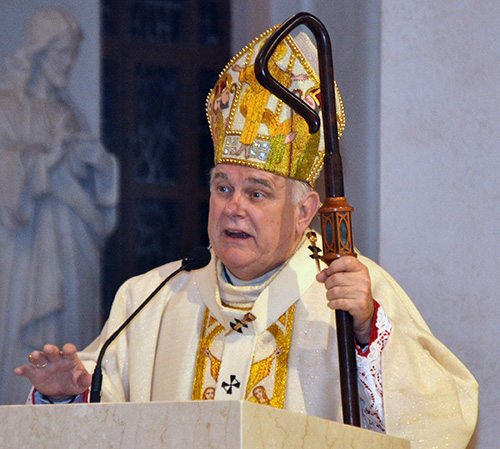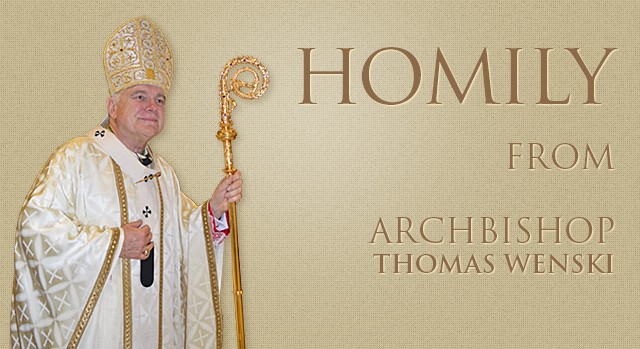By Archbishop Thomas Wenski - The Archdiocese of Miami
Archbishop Thomas Wenski preached this homily at the annual White Mass, in thanksgiving for persons with special needs. The Mass was celebrated Nov. 21 at St. Patrick Church, Miami Beach.
Today, the Church celebrates the Feast of Christ the King � yet the Gospel today presents us with quite an unsettling image of our king: He is standing before Pilate, humiliated.
He has already been arrested, insulted, and now his enemies look to have him executed. His kingdom is not like earthly kingdoms which are based on force and human pride � for his kingship is found in no worldly power but in a love which serves.

Photographer: JIM DAVIS | FC
Archbishop Thomas Wenski preaches the homily at the White Mass celebrated Nov. 21 at St. Patrick Church, Miami Beach.
Jesus is a revolutionary, and he brings a revolution � but as Pope Francis said on leaving Cuba this past September, “Our revolution comes about through tenderness, through the joy which always becomes closeness and compassion, and leads us to get involved in and to serve the life of others."
But we live in a world of fragile peace and broken promises, a world more concerned about walls than bridges; in our endless news cycles, talking heads exploit our fears and contribute to what Pope Francis has called the “globalization of indifference.” Because our culture has lost its sense of God’s tangible presence and activity in our world, human life is no longer considered the primary value to be respected and protected � and so we are confronted daily with what the pope calls “la cultura del descarte” � a throw-away culture in which the poor, the marginalized, the vulnerable can be discarded or disposed of.
Yet, as we hear in Revelations, “Jesus is the faithful witness.” He testifies not about the love of power but about the power of love. He calls us to build not societies for the precious and perfect but communities of love, tenderness, of compassion for the weak, the vulnerable. He calls us to a culture of solidarity where rather than seeking to rule over others we seek to be ruled by God. He calls us to a culture of encounter that proclaims the equal dignity of each and every person made in the image and likeness of God.
In a world in which we can find ourselves absorbed in material and thus ephemeral things, we must remember that, as his subjects, we will be judged on how we have witnessed to his truth, his love, his life.
This culture of encounter is something that I believe Best Buddies exemplifies. A culture of encounter celebrates, even in the challenges and disappointments of life, the possibility of joy, a joy that comes from the gift of oneself. For it is that capacity to give of one’s self that is the secret to a happy, well lived life.
In a culture of encounter that nourishes friendship among persons of equal dignity and worth there is no one so poor that he or she does not have something to offer, to give to the other � and, at the same time, there is no one so rich that he cannot receive from the other. Those who some might consider poor or unimportant because of developmental disabilities are capable of giving much, and those considered rich in material or intellectual gifts can and do receive so much from them.
In the Metropolitan Museum of Art in New York City, there is a painting entitled “The Adoration of the Christ Child.” It was painted by, I believe, a Dutch artist in 1515. We all are familiar with such paintings of the Nativity: They show the baby Jesus, Mary and Joseph in the center surrounded by animals, of course, but also by angels, shepherds and the Wise Men.
But in this particular painting I am talking about, one of the angels � the one closest to Mary and the baby Jesus � and one of the shepherds have the facial features that indicate that they had what we call today “Down’s syndrome.”
The painting shows Jesus enveloped in light � and that light of Jesus, the light of faith, embraces all � and it embraces those who because of their “differentness” the world might dismiss as unimportant or even as disposable. In the painting, that angel and shepherd with Down's adore the Christ child.
And if the artist painted them into that scene it was because he felt that they were not only capable of adoring him but that they also could teach us to adore the living God.
In today’s Gospel reading, Pilate is at a loss. He just doesn’t understand � and so often we do not either: Can there be a power not obtained by human means? A power which does not respond to the logic of domination and force?
Jesus came to reveal and bring a new kingship, that of God; he came to bear witness to the truth of a God who is love, who wants to establish a kingdom of justice, love and peace. Whoever is open to love hears this testimony and accepts it with faith, to enter the kingdom of God. Viva Cristo Rey!

